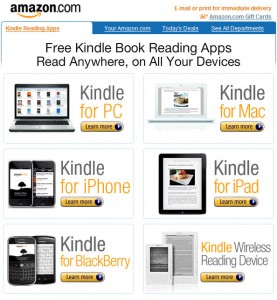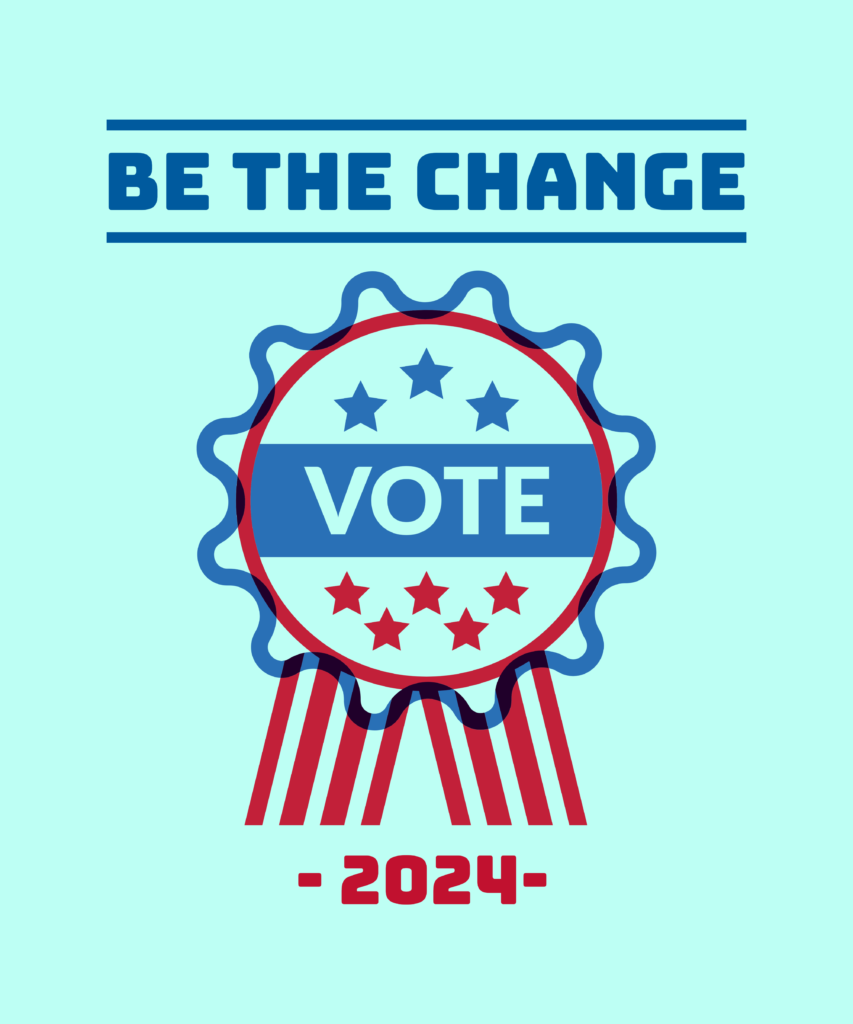
 Apple has just released a statement announcing that it has officially sold one million iPads in 28 days, less than half the number of days it took it to sell that many iPhones.
Apple has just released a statement announcing that it has officially sold one million iPads in 28 days, less than half the number of days it took it to sell that many iPhones.
Read the rest of the story here >
Observations from the Publisher
Amazon’s decision to sell the Kindle in Target was the last puzzle piece in their marketing strategy to successfully compete against Barnes and Noble’s Nook, Sony’s ebook reader and other readers available in stores. Now the playing field for the major ebook readers has been flattened.
What will ensue on an explosive level is a battle for market share and the only strategy left is an ebook price war and lower device prices. The major publishers who thought they had won the ebook pricing war with the iPad will be whining again as the price of ebooks will fall as the major ebook distributors with devices vie for market share.
The collateral benefit of the war will be a win for consumers because the price of these devices will also drop as the price of ebooks eventually stabilizes to the market’s acceptable level.
After speculation and rumor, Target has at last confirmed that it will sell Amazon’s Kindle in its bricks and mortar stores. It will cost the same $260 as Amazon would charge you, but you at least get to try before you buy, and you don’t have to wait for the mailman to show up.
And this is likely the whole point. The e-reader market has shifted from early adopters to the mainstream, and if you want to interest people like my mother in buying a brand-new kind of device, you’ll have to put it in their hands first. Us gadget freaks may be happy to pre-order $500 devices without even seeing them, but we’re the weirdos here.
The Kindle will be available in “select” Target stores from this Sunday. In reality, this means the flagship store in Minneapolis plus another 102 stores in South Florida. Putting the Kindle in real stores will also showcase it against the iPad (although not in the same store of course – iPad is currently in Best Buy only, which also sells the Nook), which is going to prove the main rival for the Kindle.
It’s an unusual move by Amazon, though, especially as it pioneered the idea of trustworthy online shopping. It’s also proof that the online retailer is willing to take a cut in profits to push its hardware, despite the availability of Kindle software on most modern platforms.
Target Stores to Sell Kindle [Businesswire]
See Also:
Photo:Charlie Sorrel
Read More http://www.wired.com/gadgetlab/2010/04/official-target-to-stock-kindle-from-sunday/#ixzz0m2cJ1YRy

The free application downloaded in a matter of minutes to your PC, Mac, iPad or Blackberry now puts Amazon’s 480,000 Kindle books in the hands of a much larger market segment – all the people who wanted a Kindle, but didn’t want to shell out the $259 for the Kindle or $459 for the larger Kindle DX.
Amazon is always ahead of the curve because they knew they would eventually lose market share keeping their Kindle books in its walled garden (proprietary to the Kindle only).
If we have learned anything in technology development, proprietary devices only work if you are first on the market like the Kindle, but as it is reverse engineered, better solutions evolve and you have release your technology, change or become a candidate for the Smithsonian. Amazon knew this all along and played their technology hand well. It was just a matter of time before Amazon would extend its Kindle books to every new ebook reading device on the market.
And be assured that the next major ebook reading device that emerges will have a Kindle application.
I found this video from Advertising Lab’s blog on an interactive version of Alice in Wonderland adapted for Apple’s iPad. Is this the future of illustrated children’s books? Read the blog at Advertising Lab.
Kindle Books Catching Up With Print Books?
Amazon.com Inc. announced at the end of 2009 that its Kindle e-reader had become the most gifted item in Amazon’s history. On its peak day of the holiday season (Dec. 14, 2009), Amazon customers ordered mo
re than 9.5 million items worldwide—a record-breaking 110 items per second—according to an Amazon press release.
Amazon also reported that on the same day, Amazon’s worldwide fulfillment network shipped more than 7 million Kindle units.
On Christmas Day, for the first time ever, customers purchased more Kindle books than physical books (attributed to gift recipients opening their Kindles and ordering e-books).
“Millions of people now own Kindles,” said Jeff Bezos , founder and CEO of Amazon.com. “And Kindle owners read a lot. When we have both editions, we sell six Kindle books for every 10 physical books. This is year-to-date and includes only paid books—free Kindle books would make the number even higher.”
Amazon Ups
Royalties
Amazon.com recently announced a 70-percent royalty option for authors and publishers on its Kindle Digital Text Platform. Beginning June 30, authors and publishers who
select the new royalty option will receive 70 percent of list price, net of delivery costs.
The Most Expensive E-book
The most expensive e-book retails for $6,232, according to The Most Expensive Journal (Most-Expensive.net![]() ). The e-book, “Nuclear Energy,” which includes three volumes of “Energy Technologies,” is sold on Amazon.com.
). The e-book, “Nuclear Energy,” which includes three volumes of “Energy Technologies,” is sold on Amazon.com.
What’s In Store …
Amazon: The Kindle Store includes more than 410,000 books,
including 100 of 112 New York Times best-sellers, according to a company press release.
Sony: Sony’s e-readers offer users access to more than 1 million e-books through Sony’s Reader Store, according to the company’s Web site.
B&N: More than 1 million titles are available for the Nook through Barnes & Nobles’ eBookstore, according to BN.com.
Wiffle Flackfern ,a specially gifted intuitively trained author ,burst upon the literary scene soon after arriving in America with his new young love Gondolia…who he calls the ‘lift of his life’ . The couple live ‘on virtual campuses’ across the Internet Colleges of the World while working to complete their many advanced certificate courses on really lots of different subjects. Wiffle has attained vast celebrity status and has been come to be known as ‘the promoter’s contingency choice ’ alternative guest lecturer. Wiffle lectures on his specialty The Marriage Capitulation Syndrome at speaking circuits like overflowing cafes and other packed venues across Rhode Island … Wiffle’s claim to fame was his profound series of ‘postcard novels’ that continue to linger on a variety of independent book distributors Top 40 lists. Wiffle lately has authored many pamphlet size books including the famous multi-faceted one part Children’s series .. , How to Metaphorically Cut Your Wife and Kids Umbilical Chords . Wiff (as he likes to be called ) wrote his latest new book 4Better as a chronological compilation of his vast pre-enlightened experiences with his family of ex-wives and ex-children , whom he still bitterly loves , but now on a non-responsive acceptance level. Wiff lives a very modest life in upscale Woonsocket Rhode Island with his present family of loyal , loving and obedient pets and his newest loyal, loving and subserviant helpmates Dysphagia Dorfblatt-Flackfern and Rosacea Rosenshwig-Flackfern. . Whifle can be reached for comment and hopefully bookings at my website www.saveyourbuddy.com
Being primarily an ebook publisher, we also offer inclusion of your book in Apple’s new iBookstore for the iPad.
In addition, we distribute your ebook on the
Romance Writers of America® (RWA) announced the finalists for the 2010 RITA Awards®.
The 2010 RITA honors romance fiction published in 2009. Over 1,000 novels and novellas were judged in 12 categories.
Winners of the awards will be announced July 31st at the RITA and Golden Heart Awards Ceremony to be held at RWA’s 30th Annual National Conference in Nashville, Tennessee.
We recently o pened our second location in Southern Shores, NC on the Outer Banks to better serve authors in that region.
pened our second location in Southern Shores, NC on the Outer Banks to better serve authors in that region.
We are currently looking for authors in all genres so please visit our Query Page for submission requirements.
We would love to hear from you.
ATTEND THE SAN FRANCISCO WRITE AND PITCH CONFERENCE
February 19 -21, 2010. All Genres
From the Algonkian Writer Conferences
What does the market really want? Reality check time. 50,000 or more in this country are struggling to write first novels, thousands of manuscripts flooding agent offices, but only a few hundred at most will ever be published by a major house. Why? … This unique writer conference was developed by the editors and authors at Algonkian Writer Conferences to provide you, the aspiring author, with not only network connections, but comprehensive, hands-on experience utilizing the craft skills, insider advice, and hard-to-swallow facts you must possess before you can even hope to get a first novel successfully published in this tougher-than-ever market–experience and info you will not receive at any other conference, and certainly, not from any Craft and Tips 101 writer magazine.
 The W&PC is also the only writer conference to evaluate your novel or work-in-progress even before you arrive. As a participant, you will discover many days worth of eye-opening pre-conference work and study, our valuable MS analysis conducted by business pros (like Charles Salzberg on the left), our own time-tested Competitive Fiction Guide, as well as network pitch sessions, panels, lectures, Q&A, and interactions with some of the best list-building agents who will be present to provide connection and advice in proportion to your needs.
The W&PC is also the only writer conference to evaluate your novel or work-in-progress even before you arrive. As a participant, you will discover many days worth of eye-opening pre-conference work and study, our valuable MS analysis conducted by business pros (like Charles Salzberg on the left), our own time-tested Competitive Fiction Guide, as well as network pitch sessions, panels, lectures, Q&A, and interactions with some of the best list-building agents who will be present to provide connection and advice in proportion to your needs.
After this conference you will be able to:
Getting published by a major house
In today’s environment, you will face more obstacles than ever. An aspiring author attempting to write the breakout novel must not only create a high concept novel premise that rings with “ca-ching” but must avoid all the common pitfalls in title, hook, early character development, prose craft, and ongoing narrative composition. Sound complicated? Well, it is. Welcome to reality! Writers unable to fulfill the many and picky demands of discriminating agents and editors will be rejected every time, and usually within seconds after reading the first page (or even the first line–no kidding).
Everyone is looking for reasons to reject
Why shouldn’t they? Hundreds of projects are right behind yours, all clamoring for publication, all written by ambitious yet soon-to-be-disillusioned writers who believe all they ever needed for success was Writer’s Digest and their local critique group to get it all straight.
After working with writers for many years, we know that isn’t true.

If you vote for Trump and his MAGA GOP members you may indirectly start World War III.
If Trump and his MAGA GOP take control of our Congress, they will cut off support for Ukraine. They already cut support on the advice of Trump when the Congress was ready to approve the spending bill with support for Ukraine.
What will happen next?

said Larry Jacobs, director of the Center for the Study of Politics and Governance at the University of Minnesota. “This is supposed to be the party of conservative principles, of tradition, of respect for customs and rules that make society governable.
“The idea that the law does not apply to Republicans is something that has now become part of the mainstream of the Republican party. We see it in terms of the approach to elections. We see it in terms of the treatment of immigrants. Some of the actions with regard to abortion may approach that level. The Republican party appears to consider the law and the constitution to be optional and to have lost legitimacy.”
From The Guardian
Republicans’ lawless leaders at odds with midterm law and order message | Republicans | The Guardian

If you vote Republican you are supporting:
– 19 GOP red states have pending laws suppressing voter’s ability to vote. Historically, dictators and Fascists have suppressed votes to stay in power.
– The GOP has come out in support of QAnon, The Oath Keepers and the Proud Boys
– You may lose a loved one, a relative or a friend in a train crash, a bridge collapse or a plane crash as Republicans strip funds from President Biden’s infrastructure bill.
– The Texas abortion ban if left to stand will be passed in several other GOP states. Idaho will pass an anti-abortion law based on the Texas law. 16 states have “trigger” abortion ban laws.
by the US Supreme Court.
https://cnn.it/3RaW1zm
https://nyti.ms/3IcANNo
With the recent Supreme Court banning EPA authority from polluters
https://bit.ly/3IfQ1Bf
on Gun Purchases – will never get passed.
Watch Jimmy Kimmel’s emotional plea to improve gun purchase background checks
https://cnn.it/3AnRweO
– will never go up leaving 18 states still paying $7.25 an hour.
– the last thing America needs are conservative leaders, especially some Republicans who want to keep America from progressing. The last thing America needs is backward-thinking leaders in the 21st Century.
– Republicans have turned to cheating to stay in power or to get back into power…and nothing is getting done by them for the American people.
The enforcement or advocacy of strict obedience to authority at the expense of personal freedom.
and everything America stands for: Truth, Justice and Liberty for all? Look what is happening in Ukraine.
*Of course, not all Republicans are like those described above. Here is a list of those who should stay in office.
House of Representatives – those who voted to impeach the former president
Senate – The Republicans who voted to convict the former president after impeachment:
YOUR VOTE COUNTS. It’s a lie to think otherwise.
Paid for by Jake Stone for American Democracy
VOTE like your freedom depended on it…because it does.

If you have a completed manuscript, we would like to hear from you. We are currently looking for titles to publish.
Go to our Query Page (see the tab on the top) and review our submission requirements before submitting your manuscript. We like to receive the first three chapters by email.
Email to
query@outerbankspublishing.com
Copyright @ 2022 - Outer Banks Publishing Group - Designed by Webriti
